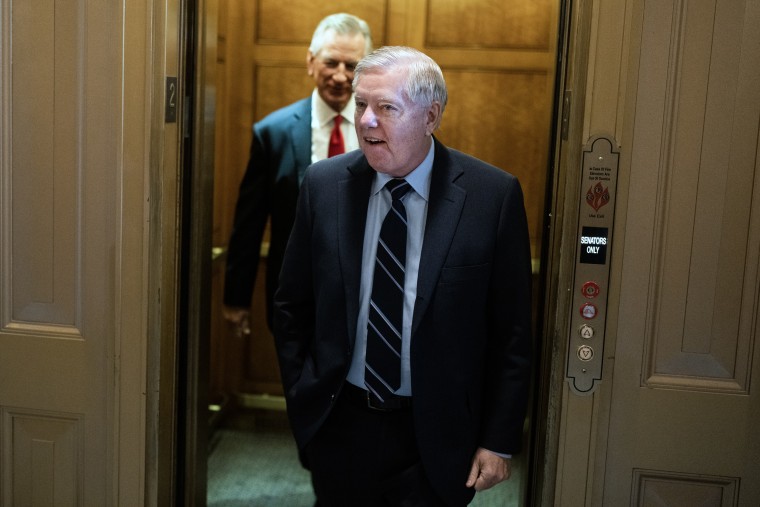U.S. ELECTION 2024: Republicans began to voice their opposition to supplying American weaponry to Britain in 1940, as Hitler’s forces advanced throughout Europe.
They said that Washington ought to put “America First” and that the United States would be squandering money by providing assistance to London.
The same catchphrase is now being used by former President Donald Trump and his congressional supporters to argue against providing military assistance to another democratic nation in Europe that is being attacked by a strong authoritarian government.
“The American public has a right to know where their money is being spent. The counteroffensive: how is it going? Do the Ukrainians now have any more hope for success than they had six months ago? This month, over two dozen Republican members expressed their opposition to further U.S. military assistance to Ukraine in a letter.
Isolationism has never been more popular in the United States than it was in the years before to America’s entry into World War II, when senators from Ohio, Robert Taft, and others cautioned against sending Britain a “blank check.”
The Japanese assault on Pearl Harbor on December 7, 1941, put a stop to the discussion on US neutrality. Over eight decades later, the result of this November’s election and the impasse in Congress over a humanitarian assistance package to Ukraine might determine whether America stays a global leader or retreats from its alliances in favor of an independent foreign policy.
Despite repeated requests from Kyiv that its forces are dying due to ammunition shortages, Trump’s congressional allies are still opposing a plan to provide further aid to Ukraine as the country celebrates two years since Russia’s full-scale invasion.
Republicans who had previously supported providing more aid to Kyiv have changed their minds; one such Republican is Sen. Lindsey Graham of South Carolina, who has been a vocal supporter of Ukraine.

Furthermore, Trump, the front-runner for the Republican presidential candidacy, is once again raising concerns about NATO’s worth and doubting the United States’ ability to keep its promises to allies should it win back the presidency.
In an earlier statement this month, Trump threatened to “do whatever the hell they want” in the event if Russia attacked a NATO nation that wasn’t spending enough on defense. In a potential agreement to end the conflict, he has also said that he would think about allowing Russia to “take over” certain areas of Ukraine.
As a senior scholar at the Brookings Institution think tank and author of many books on the background of US foreign policy, Robert Kagan said, “I do see many similarities between the views and arguments of the Taft Republicans of the 1930s and the Trump Republicans today.”
According to author Kagan of “The Ghost at the Feast: America and Collapse of World Order, 1900-1941,” “[In the 1930s], there was a fair amount of sympathy with Nazi Germany among American conservatives, who saw Hitler as a bulwark against communism, just as Trump Republicans now look to [Russian President Vladimir] Putin as a great bulwark and leader against liberalism.”
Republicans in the 1930s said that “Britain was certain to lose and that any weapons or money sent to Britain were wasted on a hopeless cause, with the money better spent at home,” Kagan said. This argument is similar to what some GOP politicians believe about Ukraine’s chances.
According to recent polls and commentators, Trump’s unrelenting criticism of Ukraine, the United States’ friends, and foreign involvement in general—echoed by his fans and right-leaning media outlets—seems to have had an impact on public perception during the previous three years.
A startling majority of Republicans—53 percent—in a recent Chicago Council on Global issues survey said that the US would be better off staying out of international issues than actively participating in them. That was the first time that a majority of Republicans had taken that stance in the survey’s 49-year history.
As for Ukraine, a Pew Research Center study done in November and December found that a growing percentage of Americans, especially Republicans, believe that the United States is supporting Kyiv too much after Russia’s full-scale invasion two years ago.
According to a Pew study, 48% of Republicans and Republican-leaning independents believe that the United States is helping Ukraine too much, while just 16% of Democrats and Democratic-leaning respondents think that the present amount of aid is too high.
According to Matthew Kroenig, vice president of the Atlantic Council think tank, the Ronald Reagan party would have enthusiastically welcomed the delivery of arms to Ukraine to combat Russian soldiers entering the country not too long ago.
For more than 25 years, Reagan essentially established contemporary Republican foreign policy. According to Kroenig, the Reagan Doctrine was all about equipping freedom fighters to combat communists wherever they may be found in the globe. “The party isn’t there right now.”
In contrast to Reagan’s views on free markets, US-led alliances, and America as a beacon of freedom, Trump Republicans are antagonistic toward immigration, free trade, multilateral agreements, and foreign policy “elites.”
Many Republicans in Congress still favor arming Ukraine, according to Kroenig, despite rising mistrust among GOP voters about assistance to that country. However, a minority in the House has managed to prevent a vote on a proposed package for Ukraine.
Republicans who oppose helping Ukraine argue that it is time for Kyiv to concede defeat and begin peace negotiations with Russia.
“I know they can’t win, which is why I haven’t voted for any money to go to Ukraine,” Alabama Republican Sen. Tommy Tuberville said. He was one of over twenty-one Republicans who opposed a proposed assistance package to Ukraine in the Senate. “When Donald Trump first enters, he will put an end to it. He is aware that Ukraine will not prevail. He is able to negotiate with Putin.

The emergence of a new right-wing isolationist and protectionist perspective is not exclusive to Trump or the United States. In Europe, far-right parties that support what is often referred to as conservative or Christian nationalism are also doubting the post-World War II order and are hesitant to equip Ukraine. According to polls, they’re getting closer.
Numerous supporters of President Trump have showered admiration upon Hungary, the country’s prime minister Viktor Orban, who has been charged of enforcing dictatorial authority over his people and opposing European help to Ukraine while maintaining cordial relations with Russian President Vladimir Putin.
Prior to Trump’s rise to political prominence, the protracted wars in Afghanistan and Iraq undermined the confidence of many Americans, particularly those on the political left, in Washington’s ability to handle global affairs and sparked doubts about the benefits of US military involvement overseas.
However, dissatisfaction with the conventional American “internationalist” strategy has developed into a series of complaints fueled by Trump, with the central thesis being that America faces threats from immigration and receives unfair treatment from its allies and the “globalists” who determine American foreign policy.
Taking up the Space
What would happen to the United States and the globe if Congress rejects the planned assistance for Ukraine and Trump returns to the White House prepared to implement his “America First” agenda?
The likelihood of regional or perhaps global conflicts would rise, the international economy may enter a more unstable period, and authoritarian opponents would attempt to fill the void, according to current and former Western officials and experts.
Ricarda Lang, a co-leader of Germany’s Green Party, a constituent of the nation’s ruling coalition, stated at the recent Munich Security Conference that if Russia’s Putin prevails in Ukraine, “he, but also other forces like China, are going to learn that it’s possible to just change borders and that NATO is not going to hold it against [them]”.
“A world with less security, and… a world with less freedom for the E.U. but also for the U.S.” would result from that.
The world’s and the United States’ GDP per capita has expanded significantly since 1945 as a result of the “rules-based order” that the United States has led since World War II. According to Kroenig, there were perhaps a dozen democracies in the globe in 1945, but now there are over 100. Over the last 80 years, the U.S. and its allies have contributed to the establishment of a more peaceful, affluent, and generally stable age, but he said that Americans now take it for granted.
“I believe that since it has worked so well, people believe that things will continue to run well even if the United States withdraws. And regrettably, it is untrue,” he said. “If the United States leaves, there will be conflict and economic chaos because bad actors will step in to fill the void.”
Proponents of “America First” argue that since the end of the Cold War, the world has changed significantly, the United States is now overextended, American workers have been excluded from the advantages of free trade, and the country should concentrate on its domestic needs, which may include tightening restrictions on immigration across the southern border.
However, Vice President Kamala Harris attempted to argue for America’s “continued global leadership” at the Munich Security Conference a week ago, cautioning against betraying friends.
Additionally, history has shown to us that seclusion is not insulation and that we cannot combat external challenges if we simply turn inward. In fact, dangers have increased as America has become more isolated, she said.
According to Mary Elise Sarotte, author of “Not One Inch: America, Russia, and the Making of Post-Cold War Stalemate,” when the United States withdrew into isolationism after World War I, the country was assaulted on its own.
The United States has been dedicated to beginning its defense on the far ends of the seas ever since that strategy failed, the official said. “Going backwards in time would be a grave mistake.”
News Collected: NBC NEWS





